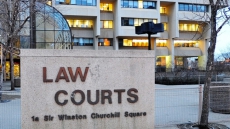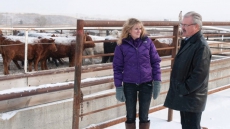VICTORIA - Environment Minister Mary Polak says new legislation governing greenhouse gas emissions from liquefied natural gas plants sets pollution benchmarks that will establish the British Columbia industry as the cleanest in the world.
Polak tabled the Greenhouse Gas Industrial Reporting and Control Act Monday, saying B.C.'s emission benchmarks will be lower than any other LNG facility in the world.
She said the legislation will permit companies to purchase greenhouse gas offsets and contribute to a technology fund to reach the benchmark.
Environmental groups have raised concerns about increased GHG emissions associated with extracting and burning natural gas.
Many have suggested permitting LNG plants to run with natural gas will blow the province's legislated greenhouse gas reduction targets, which call for emission reductions of one-third within the next six years.
The new law does not alter the government's GHG emissions reduction targets, said a statement released by the Ministry of Environment.
LNG facilities with emissions below the set benchmark will receive credits they can sell, while operations that don't meet the limit may be fined, said the ministry statement.
The GHG intensity benchmark set by the B.C. government is below pollution limits established by LNG plants in Australia, Norway and the United States.
The B.C. limit set is .16 tonnes of carbon dioxide for each tonne of LNG produced. It includes all GHG emissions from the point where gas enters a facility to when it is loaded onto a ship or rail car.
"The .16 benchmark sets a new, recognized global standard for LNG facilities," said an Environment Ministry statement. "Through independent studies and government analysis, it was determined that leading global facilities had emissions intensities between 0.18 and 0.27 tonnes of (carbon dioxide) per tonne of LNG produced."
Investments in offsets and the technology fund will be used to cut GHG emissions in the natural gas and other sectors of B.C. economy, said the ministry. GHG emission reduction technologies include, low-or-no-venting equipment, electrification, cogeneration, waste heat recovery, natural gas vehicles and examining carbon capture and storage.
Premier Christy Clark calls the proposed LNG industry a worldwide pollution fighter because it will replace dirty coal with cleaner-burning natural gas in Asian countries, especially China.
Finance Minister Mike de Jong will introduce legislation Tuesday that outlines the government's plans to tax the LNG industry.





